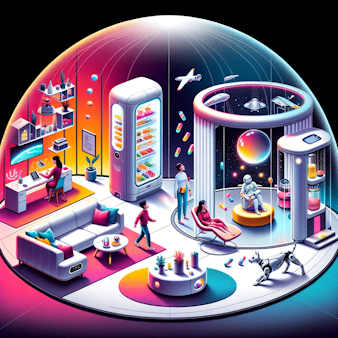F.M. Esfandiary was an Olympic athlete turned transhumanist philosopher and author.
His 1973 book Up-Wingers: A Futurist Manifesto details his vision of a better future for humanity, based on social and technological advances.

It’s interesting to read old books about the future and compare their hopes with our reality. It may help with our current attempts for a better future.
The basic premise is that we need to stop viewing the world through Left and Right political lenses, which are both conservative in their own way. Neither of those views will produce a better world.
Instead, we need to look Up – embrace technological progress. That’s the direction to a better world.
FM-2030 (as he renamed himself, to signify his desire to live until 2030) noted that the years from 1955-1973 were a time of optimism. However, he saw the mood changing to pessimism.
Still, he was optimistic that it could also have been the beginning of a period of major, positive upheavals in technology and society.
He divided changes into two areas:
- Planetary Movement – eliminating age-old systems and replacing them with “cybernated” (computerized and automated) systems.
- Cosmic Upheaval – a new stage of human development: longevity, immortality, and mind-uploading.
To get to this imagined future, he felt we needed to switch from pessimism to optimism.
We’d also need to stop hyper-focusing on our small individual problems and realize we were small points in infinite timelines and infinite space.
The future and the Universe were waiting for us – if we could gather the courage to step forward into them.
He saw four main sources of pessimism:
- Lack of the self-esteem that we could succeed at achievement.
- Puritan guilt that we didn’t “deserve” happiness or success.
- Lack of historical perspective. Like a fish in water, we couldn’t recognize the progress surrounding us.
- Theological and philosophical indoctrination that we could only “accept our fate” on Earth.
“If you are doing nothing for the world you have no moral right to complain”
FM-2030
He also believed we should question everything. None of our beliefs, habits, or systems should be safe from being replaced with something better.
This gets into a part of the book that may make many people uncomfortable.
He objected to “ownership” of children by their parents. He believed we grew up equating being loved and valued with being “owned”.
This extended beyond families to the patriotism we have for nations. And this inevitably leads to jealousy, rivalry, and violence.
That sounds reasonable… so far.
However, his solution to this problem was straight out of Aldous Huxley’s Brave New World.
Scientists would select the best eggs and sperm to use to create optimal (by whose definition?) humans. The babies would be grown in artificial wombs, with the “best” children eventually being cloned.
Once born, the babies would be raised by different people, moving from one Mobilia (commune) to another, to prevent attachment and ownership.
Thinking of the people I know who were adopted, or grew up in foster homes, I have my doubts about the effectiveness of this idea.
I also feel we do need to keep genetic variations and our “weirdos”.
But that’s only a portion of the book. There are plenty of other ideas around space travel, biological enhancements, and automation.
As someone who has traveled a bit, I like his idea of Mobilia, small commune-like places where people would live for short periods of time.
However, I haven’t seen examples of successful intentional communities, other than those based on religion. My gut feeling is that most of those fail due to the “tragedy of the commons”. If you don’t personally own something, there’s less of a desire to care for it.
FM-2030 wanted to replace schools with something like what’s currently available with online training.
He expected it would be too expensive and slow to retrofit current cities with advanced technology. It would be better to just build new cities with high-tech infrastructures.
Individual car ownership was something he expected to eliminate. Automated transportation, like the self-driving cars we’re getting close to having, was his view of the future.
Some of FM-2030’s ideas sound like the WEF idea that, “You’ll own nothing and be happy”. I’ve always felt that statement includes the unspoken, “And you’ll be lifetime renters from us, the asset-owning ‘Elites’, providing us with steady lifetime incomes.”
However, FM-2030 also foresaw living a life of leisure and abundance, while working fewer hours.

So, I expect his view would be that technology would provide our material needs at a cost so low it may not be worth measuring – as in the world of Star Trek.
Some things do date the book: concern about a population explosion and expecting changes to be managed by the United Nations.
However, it was interesting to read ideas from someone willing to get to the root cause of problems and willing to replace existing systems completely.
On a side note, FM-2030 didn’t make it to 2030. He died from pancreatic cancer in 2000, at 69. However, he is in cryonic suspension at Alcor. So, there’s still a chance he may get to see some of his visions become real.